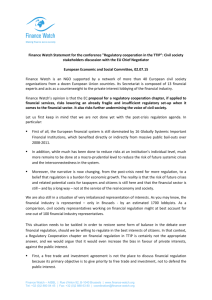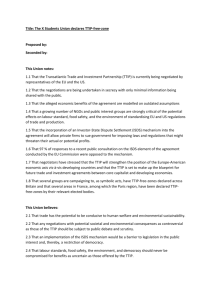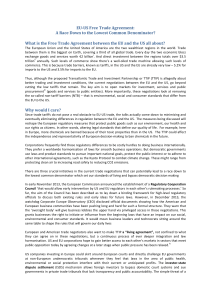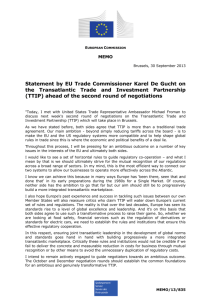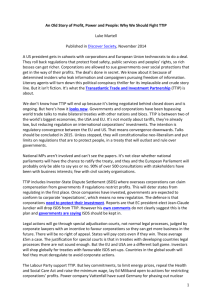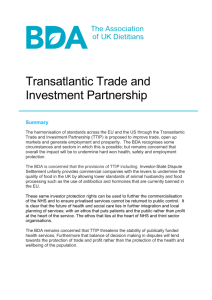Template letter to MEP re TTIP
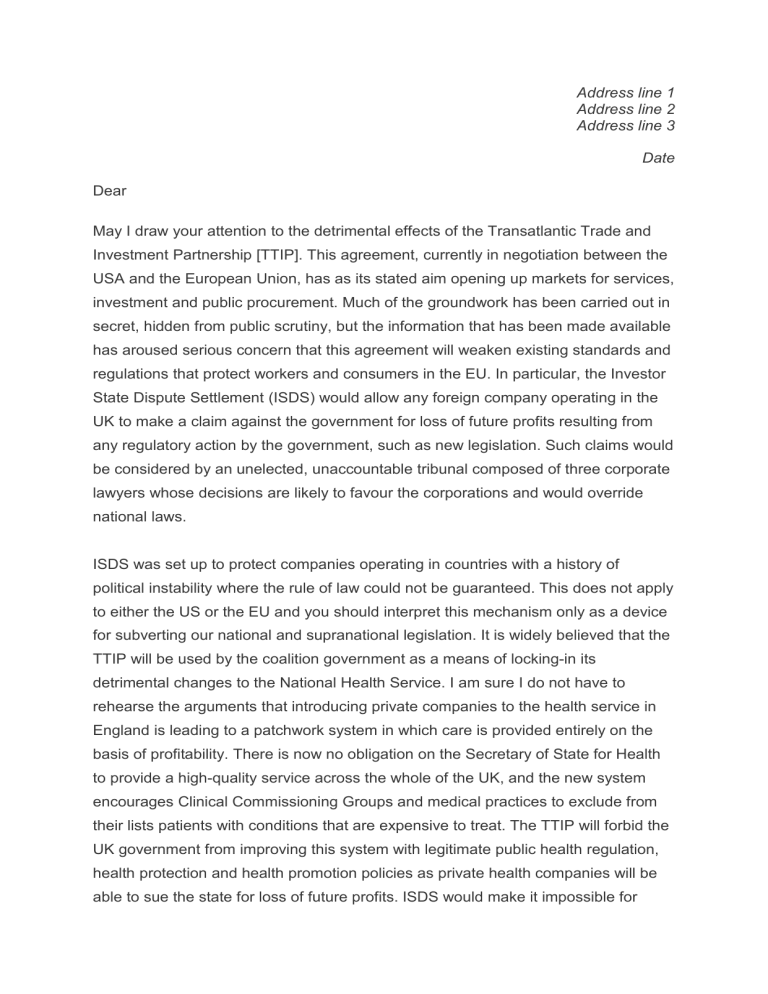
Address line 1
Address line 2
Address line 3
Date
Dear
May I draw your attention to the detrimental effects of the Transatlantic Trade and
Investment Partnership [TTIP]. This agreement, currently in negotiation between the
USA and the European Union, has as its stated aim opening up markets for services, investment and public procurement. Much of the groundwork has been carried out in secret, hidden from public scrutiny, but the information that has been made available has aroused serious concern that this agreement will weaken existing standards and regulations that protect workers and consumers in the EU. In particular, the Investor
State Dispute Settlement (ISDS) would allow any foreign company operating in the
UK to make a claim against the government for loss of future profits resulting from any regulatory action by the government, such as new legislation. Such claims would be considered by an unelected, unaccountable tribunal composed of three corporate lawyers whose decisions are likely to favour the corporations and would override national laws.
ISDS was set up to protect companies operating in countries with a history of political instability where the rule of law could not be guaranteed. This does not apply to either the US or the EU and you should interpret this mechanism only as a device for subverting our national and supranational legislation. It is widely believed that the
TTIP will be used by the coalition government as a means of locking-in its detrimental changes to the National Health Service. I am sure I do not have to rehearse the arguments that introducing private companies to the health service in
England is leading to a patchwork system in which care is provided entirely on the basis of profitability. There is now no obligation on the Secretary of State for Health to provide a high-quality service across the whole of the UK, and the new system encourages Clinical Commissioning Groups and medical practices to exclude from their lists patients with conditions that are expensive to treat. The TTIP will forbid the
UK government from improving this system with legitimate public health regulation, health protection and health promotion policies as private health companies will be able to sue the state for loss of future profits. ISDS would make it impossible for
CCGs to cancel contracts with private providers, even when those firms were providing inadequate standards of patient care, because they would then face a legal challenge for loss of earnings that they could not fund. It will also limit the government’s ability to regulate professional standards and qualifications regarded for healthcare workers and lower the quality of patient care. In short, it would be impossible to reverse the disastrous Health and Social Care Act 2012, and its marketisation of the NHS. Do you want the health of your constituents to depend on a foreign company’s balance sheet?
You may wish to take heart from comments by the British Medical Association that it believes the NHS will be exempt from the TTIP. There is no evidence to support this statement. In fact, David Cameron stated in reply to a Parliamentary question in
June 2013: “I am not aware of a specific exemption for any particular area, but I think that the health service would be treated in the same way in relation to EU-US negotiations as it is in relation to EU rules.” In fact, as comments from the chairman of the Liberalisation of Trade in Services Committee (LOTIS) and financial services pressure group TheCityUK make clear, no issue had been identified that would allow exclusion of any sector from the second round of TTIP negotiations in November last year. You should also note that the Lisbon Treaty provides no protection for the NHS, despite the arguments of some people. Furthermore, evidence to the House of Lords
European Sub-Committee on External Affairs has shown that public health measures such as warnings on food labels, pesticides and chemicals, and other potentially toxic or unhealthy products may be restricted to bring the EU in line with the narrow approach to risk assessment taken in America (that promotes sales) and away from the
EU’s broader precautionary principle (that promotes safety).
Are you in favour of sales or the safety of your constituents?
You will know that the USA has not implemented fundamental labour rights such as the rights to freedom of association and collective bargaining. Regulatory harmonisation brought about by the TTIP will lower European labour rights to
American standards – the agreement will always bring standards down to the lowest common denominator. This means that workers in all sectors, including (again) health, will lose vital rights in their struggle for fair pay and conditions of work. Do you support attacks on workers’ rights?
To sum up: The TTIP is ill-judged in its entirety and neither the UK nor the European
Union should have anything to do with it. It would give huge power to transnational corporations while stripping away member states’ rights to regulate them and, in that sense alone, represents an enormous threat to democracy. British people fought long, arduous battles to gain the few rights they have, and neither you nor anybody else in the European Union have a mandate to sign those rights away. This agreement may safeguard the profits of large multinational companies, ensuring that huge amounts of money go into their shareholders’ bank accounts (wherever they may be), but it will undermine the wages of everybody who works for them – again, according to the principle of the lowest common denominator. Yet it is workers’ wages that support national economies
– by necessity they spend most (if not all) of their income as soon as they get it, on rent, utility bills, groceries and other vital supplies. The TTIP will harm national economies. There is an argument that the
TTIP will create growth and jobs – but there is little evidence for this, and even that is poor. The European
Commission’s own impact assessment admits that a 0.5 per cent increase in growth would be “optimistic”, and independent research suggests that a meagre 0.01 per cent increase in the growth rate over 10 years is more likely.
The North American Free Trade Agreement between the US, Canada and Mexico led to a net loss of almost a million jobs in the US. Negotiations on the TTIP represent a test on where your loyalties lie. Do you support the people who elected you – or are you a puppet of the corporations?
As my representative, I am asking you to take all steps necessary to publicise this attack on democracy and on our sovereignty, and to take any action
– individually or collectively – to put an end to it. Please let me know what you intend to do.
Yours sincerely,
[Your name]
